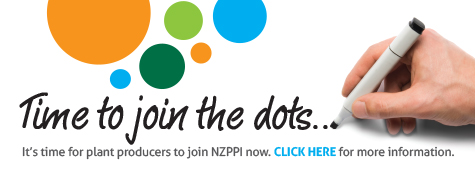GERMAC
The Germplasm Advisory Committee, GERMAC, is the consultative forum between the plant germplasm import industry groups, and the Ministry for Primary Industries (MPI). It works collaboratively to foster open communication between industry, MPI, and key agencies in the regulatory system for plant imports. The committee provides input into strategic direction, policy formulation, priority setting and the cost-effective delivery of the plant import programme. It also helps establish industry strategy, policy, standards, specifications and codes of practice based on industry consultation and advice regarding the limits of legislation to decision-making bodies.
John Liddle of NZPPI is GERMAC's Chair. If you've a plant import issue that you need resolved, contact John or another committe members - listed on MPI's GERMAC webpage.
GERMAC meeting - Aug 2017
- PEQ facility standard update
- Policy on location of 3B PEQ facilities
- Outcomes of a meeting with Martyn Dunne on Imports resource and opportunities to improve imports processing
- Focus areas for two new staff in the import team
- Improving import health standards format
- GERMAC terms of reference and CRI representation (on Bill Griffin’s retirement)
- IHS review schedule (and where work to assess crops for L3A fits)
- PHEL capacity, transparency
- Offshore accreditations schedule
- Next generation sequencing assessment update (and photoautotrophic TC opportunity)
- Next meeting 27 November
GERMAC meeting - Feb 2017
GERMAC met 28 February. Most of the discussion related to identifying opportunities to improve the import process. Some twenty processes were identified and prioritisation begun. Other agenda matters ... Level 3B PEQ capacity and the new PEQ facility standard - more about the latter here - http://mpi.govt.nz/news-and-resources/consultations/draft-facility-standard-for-post-entry-quarantine-for-plants
GERMAC meeting 1 November 2017
Salient discussion points at GERMAC's 1 November included;
- A lengthy discussion on issues with and implementation of the new PEQ Standard. The meeting settled upon
- Acceptance of the new Standard addressing import risks appropriately, and that the transition from old to new Standard is appropriate.
- A process to identify priority crops that need to assess against the new Level 3A criteria - essentially less onerous than the Level 3B criteria that replaced the previous Level 3 regime. Once identified, MPI's prioritization process will determine where they fit in MPI's workplan.
- MPI begins a fresh communications programme in November to introduce its operator training programme.
- A process to better understand, approach and possible share/contract surplus capacity in the new Australian facility.
- Emergency measures to counter the threat from Xylella.
- The use of accredited offshore facilities to hasten import timeframes.
- The possibility industry (or individual) funded import health standard development.
- Preliminary discussions to inform the Level 3B Investment Logic Mapping below. This included the need for / likelihood of government funding of Level 3 capacity - with varying views around the table.
Level 3 PEQ Capacity
August 2016 Update
GERMAC's August meeting included discussion on:
- A project to understand the pest risks associated with tissue culture
- Prioritisation of import health standard reviews against the new PEQ facility standard
- Level 3 PEQ capacity
- The use of Next Generation Sequencing to detect and identify plant viruses
- Applications for new or review of Import Health Standards
- Progress through MPI's Germplasm Imports work plan.
... read more
2014 Updates
GERMACs November meeting focused on actions arising from its Barriers to the Importation of Germplasm report. Among many issues that limit and impede access to new plant material, two major matters arose for intensive representation and future work with MPI - those of the time it takes and the resource MPI has available to undertake the review or development of Import Health Standards and their precursor Risk Assessments. These two processes determine whether a species can be imported and the conditions under which they can be imported.
In October GERMAC industry members met with Martyn Dunne, MPI Director General, and Scott Gallacher, one of MPIs Deputy Directors, and Scott attended the November meeting. Both committed to work with us, recognising our needs, but also noting resource constraints, the latter being a common issue! Seeking to influence MPIs resource allocation, GERMAC has asked its Plant and Food Research member to gather data for a business case demonstrating the value that new and imported germplasm bring to the New Zealand economy.
GERMAC Paper - Barriers to importation of plant germplasm
1-Oct-2014
The Germplasm Advisory Committee signed off on its "Barriers to importation of plant germplasm" report at its meeting in September. Foremost among matters of concern is the time taken to complete Import Health Standards (IHS) - the key to ensuring safe and effective access to new plants, or for continued access to species covered in an existing IHS when new offshore risks are identified. Industry members of GERMAC have requested a meeting with MPI Director General Martyn Dunne.
Barriers to importation of plant germplasm - Thanks to those who provide GERMAC with information
12-Apr-2014
Thanks to those who provided details early in March on the frustrations associated with plant importation. Two major issues arose from your feedback, the time it takes and resources available to undertake risk assessments and the relevancy of many import health standards.
Several other operational matters were raised and in discussion with MPI, they recognise those should not have happened. Just how we avoid these is subject to continued discussion, but one route to avoiding border and treatment hassles is to ensure you are reacting to the latest copy of the appropriate standard. In most cases this is IHS155.02.06 Importation of Nursery Stock. It is updated as new threats are assessed and the latest copy is always available at http://www.biosecurity.govt.nz/files/ihs/155-02-06.pdf. That won’t solve all the hassles, but it’s a good place to start.
The GERMAC meeting of 18 March began to develop a project to identify the "current barriers to the importation of germplasm" and an industry-led project plan is now with various stakeholders for review. NGINZ has responded favourably to the proposal and await the next step.


